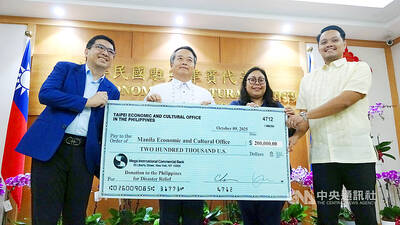Beijing would not give up its military aggression against Taiwan no matter which political party wins the presidential election next month, an Australian academic said on Thursday.
The University of Sydney’s US Studies Centre invited Australian and US academics to join a panel discussion on Taiwan’s presidential election, and its implications for Australia and beyond.
Richard McGregor, a senior fellow for East Asia at the Sydney-based Lowy Institute think tank, said that the presidential election is important, as it “represents the fundamental break between China and Taiwan.”

Photo: CNA
If the Democratic Progressive Party (DPP) wins the presidency again, it would “undoubtedly” provoke some kind of military response from Beijing, as Chinese officials and academics have told him, McGregor said.
While an invasion is unlikely, China might impose a blockade to “exhibit US impotence,” making the US “look like it’s losing its power and losing its grip,” he said.
If the Chinese Nationalist Party (KMT) wins, “there will be more carrots” from China, probably including lifting some trade embargoes, and increasing people-to-people and official exchanges, he said.
However, Beijing would not give up its “fundamental aim on unification,” meaning military exercises and coercion “will never go away,” he said.
Chinese President Xi Jinping (習近平) “has been quieter” prior to the election this time compared with the previous one in 2020, when he spoke about how “one country, two systems” in Hong Kong would apply to Taiwan, which backfired and might have contributed to the DPP’s victory, McGregor said.
Beijing has a variety of approaches to exert its influence, such as roping in Taiwanese officials to build grassroots support, economic coercion and disinformation campaigns, he said.
Former US National Security Council senior director for Asian affairs Michael Green said that the US is witnessing the highest-ever level of bipartisan support for Taipei and concern about what Beijing might do.
For Southeast Asian countries, they hope to maintain the “status quo” and avoid conflicts “at all costs,” so they are unlikely to take a strong position on Taiwan’s election, said Lavina Lee, a senior lecturer in Macquarie University’s Department of Security Studies and Criminology.
China has been attempting to “neutralize” Southeast Asian countries, preventing them from getting involved in a Taiwan contingency, Lee said, adding that the efforts have been “quite successful.”
Taiwan building “a strong, robust democracy in such a short period of time” from the ground up is “actually extremely remarkable,” she said, adding that the wishes of Taiwanese should be respected.
Taiwan has come a long way from being ruled by an authoritarian regime under martial law to becoming a beacon of democracy in the Asia-Pacific region, Representative to Australia Douglas Hsu (徐佑典) said.
Taiwanese are willing to do anything to safeguard their democracy, which was born of great sacrifice and is a “way of life,” Hsu said.
“This is our election. This is our democracy,” he said.
Hsu said he believes that whoever wins the presidential election would ensure that Taiwan continues to be a “resilient, free and democratic country,” as well as a responsible global stakeholder.

A drunk woman was sexually assaulted inside a crowded concourse of Taipei Railway Station on Thursday last week before a foreign tourist notified police, leading to calls for better education on bystander intervention and review of security infrastructure. The man, surnamed Chiu (邱), was taken into custody on charges of sexual assault, taking advantage of the woman’s condition and public indecency. Police discovered that Chiu was a fugitive with prior convictions for vehicle theft. He has been taken into custody and is to complete his unserved six-month sentence, police said. On Thursday last week, Chiu was seen wearing a white

The Taoyuan Flight Attendants’ Union yesterday vowed to protest at the EVA Air Marathon on Sunday next week should EVA Airway Corp’s management continue to ignore the union’s petition to change rules on employees’ leave of absence system, after a flight attendant reportedly died after working on a long-haul flight while ill. The case has generated public discussion over whether taking personal or sick leave should affect a worker’s performance review. Several union members yesterday protested at the Legislative Yuan, holding white flowers and placards, while shouting: “Life is priceless; requesting leave is not a crime.” “The union is scheduled to meet with

‘UNITED FRONT’ RHETORIC: China’s TAO also plans to hold weekly, instead of biweekly, news conferences because it wants to control the cross-strait discourse, an expert said China’s plan to expand its single-entry visa-on-arrival service to Taiwanese would be of limited interest to Taiwanese and is a feeble attempt by Chinese administrators to demonstrate that they are doing something, the Mainland Affairs Council said yesterday. China’s Taiwan Affairs Office (TAO) spokesman Chen Binhua (陳斌華) said the program aims to facilitate travel to China for Taiwanese compatriots, regardless of whether they are arriving via direct flights or are entering mainland China through Hong Kong, Macau or other countries, and they would be able to apply for a single-entry visa-on-arrival at all eligible entry points in China. The policy aims

The government yesterday donated US$200,000 to the Philippines to support post-earthquake relief and recovery efforts, following a powerful magnitude 6.9 quake that struck Cebu Province late last month, killing at least 72 people and injuring 559 others. The donation was presented earlier yesterday by Representative to the Philippines Wallace Chow (周民淦) to Cherbett Maralit, deputy resident representative of the Manila Economic and Cultural Office, at Taiwan’s representative office in Manila. In his remarks, Chow expressed concern for those affected by the magnitude 6.9 earthquake that struck the central Philippines on the night of Sept. 30. "We sincerely hope for the earliest possible